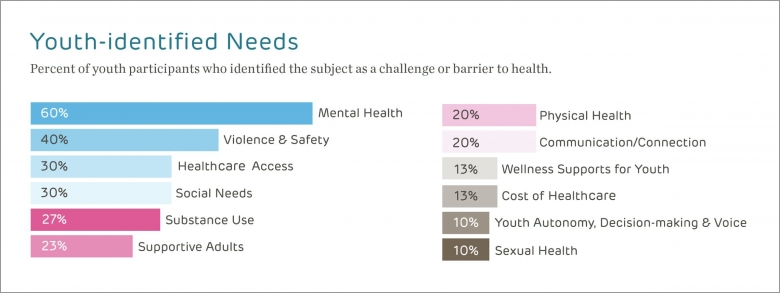CHOP is pleased to present its 2022 Community Health Needs Assessment (CHNA) report. CHOP participated in a Regional Community Health Needs Assessment that identified health needs throughout Southeastern Pennsylvania. Identifying and addressing the unmet health needs of local communities is a core aspect of the care provided by hospitals and health systems across the U.S. and a goal that CHOP strongly supports. CHOP's 2022 – 2025 Implementation Plan lays out how the hospital's strategy to address the unmet health needs.
Recognizing that hospitals and health systems often mutually serve the same communities, a group of local hospitals and health systems have again collaborated on a Southeastern Pennsylvania (SEPA) Regional CHNA (rCHNA), an effort spearheaded by the Health Care Improvement Foundation and the Philadelphia Department of Public Health. More details of specific partners can be found in the report.
Hospitals/health systems and supporting partners collaboratively developed the community health needs assessment process and report to identify regional health priorities and issues specific to each participating institution's service area. In terms of data collection, Philadelphia Department of Public Health (PDPH) led the collection and analysis of quantitative indicators for the region. Health systems provided information about their services, recognitions, and impact of prior implementation plans. Health Care Improvement Foundation (HCIF), Philadelphia Association of Community Development Corporations (PACDC), community partners in the region, and qualitative leads collaborated on qualitative data collection for geographic communities and key topics and populations. The HCIF synthesized findings to provide inputs for prioritization process. Inputs were organized into 12 community health needs that were categorized across three domains.
Health Issues
Physical and behavioral health issues significantly impacting the overall health and well-being of the region
- Chronic Disease Prevention and Management
- Mental Health Conditions
- Substance Use and Related Disorders
Access and Quality of Healthcare and Health Resources
Availability, accessibility, and quality of healthcare systems and other resources to address issues that impact health in communities across the region
- Access to Care (Primary and Specialty)
- Food Access
- Healthcare and Health Resources Navigation (Including Transportation)
- Culturally and Linguistically Appropriate Services
- Racism and Discrimination in Health Care
Community Factors
Social and economic drivers of health as well as environmental and structural factors that influence opportunity and daily life
- Community Violence
- Housing
- Neighborhood Conditions (e.g., Blight, Greenspace, Air and Water Quality, etc.)
- Socioeconomic Disadvantage (e.g., Poverty, Unemployment)
Youth Voice
 Children and youth represent a population with diverse health needs and unique vulnerabilities that require urgent attention to prevent lifelong negative repercussions and maximize the potential for growth and thriving.
Children and youth represent a population with diverse health needs and unique vulnerabilities that require urgent attention to prevent lifelong negative repercussions and maximize the potential for growth and thriving.
Unfortunately, the barriers of well-being for all children and youth in the region are significant, as many families struggle with economic stability to support their children and racial, and ethnic inequities related to education and health outcomes persist. The negative impacts of the COVID-19 pandemic have exacerbated these issues and responses on youth learning and development are increasingly being documented.
To facilitate understanding of health issues specific to children and youth, several inputs identified by youth are also represented in this report, including youths’ perceptions of community assets and barriers to health, health needs specific to youth, and ideas for potential solutions. In addition, the Steering Committee sought to hear directly from youth (ages 11 to 25) to ensure robust inclusion of youth voice in the rCHNA. A subset of participating health systems formed a committee to guide the development of this data collection process, which centered on the engagement of youth-serving organizations and programs based in the region.
Read the Youth Voice section of the 2022 Southeastern PA Regional CHNA here.